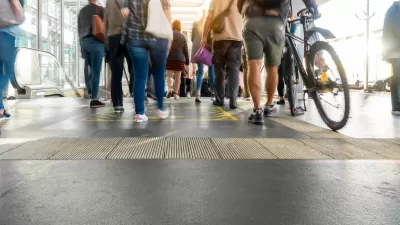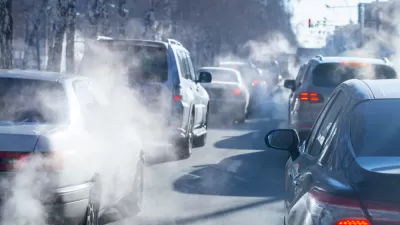The state’s Greenhouse Gas Planning Standard uses tangible financial penalties to prioritize transportation projects that reduce emissions.

In a guest post on TransitCenter, Planetizen’s own James Brasuell outlines a new Colorado rule that “rearranges regional capital investment plans to prioritize the transportation modes that most effectively reduce greenhouse gas (GHG) emissions: public transit, walking, and biking.”
The state adopted its GHG Transportation Planning Standard in December 2021, requiring its five metropolitan planning organizations (MPOs) to set clear emissions reduction goals. “Under the GHG Transportation Planning Standard, MPOs failing to meet greenhouse gas targets (GHG) targets are required to develop mitigation action plans” that contribute to “good projects,” i.e. those that help reduce vehicle miles driven and promote alternate modes of transportation.
Brasuell describes the broad-based coalition that grew around the effort to develop the Planning Standard, which encompassed various levels of government and nongovernmental advocates. Already, the Denver Regional Council of Governments (DRCOG) scrapped a freeway expansion plan due to the Planning Standard.
Colorado’s plan could well serve as a model for other states. “While many states’ climate plans are completely separate from their actual expenditure plans, the mode shift required by Colorado’s GHG Transportation Planning Standard will be enforced with tangible fiscal penalties–a degree of financial consequences not achieved by other laws around the country, such as California’s SB 375.”
FULL STORY: Colorado’s ‘Greenhouse Gas Planning Standard’ Changes the Transportation Equation

Trump Administration Could Effectively End Housing Voucher Program
Federal officials are eyeing major cuts to the Section 8 program that helps millions of low-income households pay rent.

Planetizen Federal Action Tracker
A weekly monitor of how Trump’s orders and actions are impacting planners and planning in America.

Ken Jennings Launches Transit Web Series
The Jeopardy champ wants you to ride public transit.

Driving Equity and Clean Air: California Invests in Greener School Transportation
California has awarded $500 million to fund 1,000 zero-emission school buses and chargers for educational agencies as part of its effort to reduce pollution, improve student health, and accelerate the transition to clean transportation.

Congress Moves to End Reconnecting Communities and Related Grants
The House Transportation and Infrastructure Committee moved to rescind funding for the Neighborhood Equity and Access program, which funds highway removals, freeway caps, transit projects, pedestrian infrastructure, and more.

From Throughway to Public Space: Taking Back the American Street
How the Covid-19 pandemic taught us new ways to reclaim city streets from cars.
Urban Design for Planners 1: Software Tools
This six-course series explores essential urban design concepts using open source software and equips planners with the tools they need to participate fully in the urban design process.
Planning for Universal Design
Learn the tools for implementing Universal Design in planning regulations.
Heyer Gruel & Associates PA
Ada County Highway District
Institute for Housing and Urban Development Studies (IHS)
City of Grandview
Harvard GSD Executive Education
Toledo-Lucas County Plan Commissions
Salt Lake City
NYU Wagner Graduate School of Public Service





























